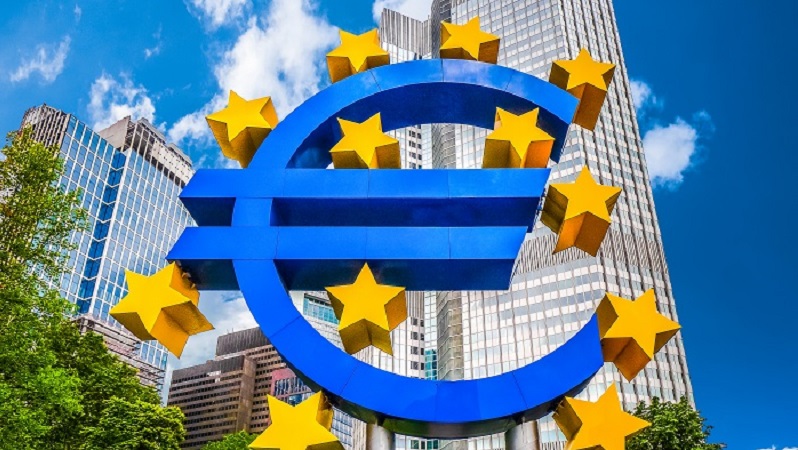The European Central Bank (ECB) formally ended its asset purchase programme on Thursday, despite concerns about an economic slowdown, and kept benchmark interest rates unchanged.
ECB president Mario Draghi said the timing of rate rises was not discussed in the ECB’s meeting in Frankfurt leading to speculation that rate rises – expected towards the end of next year – may be pushed back in the face of a weakening global economy.
As expected, the ECB’s quantitative easing programme – which has purchased more than €2.6trn (£2.34trn) of government and corporate bonds over the last three-and-a-half years – will cease at the end of this month.
‘Increased general uncertainty’
However, the ECB has lowered its eurozone forecasts for growth this year and next in the face of “increased general uncertainty”, Draghi said, as risks have moved towards the downside.
Euro area GDP growth is now forecast at 1.9% this year and 1.7% in 2019, slightly lower than previous projections, following weaker-than-expected growth in Germany and Italy.
The eurozone’s dependence on Germany has been brought into sharp relief in recent months as German growth has slowed, dragged down by weakness in its auto sector as new emission standards are introduced.
Industrial production in France, on the other hand, showed an unexpectedly strong increase in October. The rebound in France was strong in the automobile industry, where production rose 2.9% in October, after a 5.8% slump from August to September.
Resilient domestic demand
Bill Papadakis, macro strategist at Lombard Odier said the overall economic picture in the eurozone remained solid, pointing to resilient domestic demand combined with falling unemployment and improving income growth.
“The fact that 2018 GDP growth just shy of 2% is considered disappointing says a lot about how far the eurozone has come since the crisis years,” he said
“More meaningful perhaps is to look at growth in relative terms: after slightly outpacing the US in 2016 and 2017, the eurozone is lagging by more than 1% in 2018 – a marked reversal of the differential.”
Papadakis added vulnerabilities remain at the core of the eurozone’s current growth model with a reliance on external demand. “Having come into the crisis with a small current account deficit, the eurozone has now built up a very substantial surplus of roughly 3.5% of GDP. This has made its economy dependent on swings in global trade, and in particular on the evolution of demand in its major trade partners,” he said.
Labour markets could push rate rises
Guy Foster, head of research, at Brewin Dolphin said the tightness of the labour markets in Europe, particularly in Germany, could still prompt the ECB to start raising rates at some point next year.
German unemployment fell in November to 4.8% from 4.9% the previous month.
“Employment in the wider eurozone is quite fungible so it’s possible to see big increases in employment in Spain in particular as a result of labour tightness in Germany,” Foster said.
China squeeze on eurozone
“Eurozone growth should have been stronger in 2018. The dollar has risen almost 10% against the euro this year which would normally be a big boost to European exports. However, European exports have underperformed on a trade weighted basis amid a lot of political uncertainty in Europe,” Foster continued.
“However, a bigger factor is that China now buys a lot more European imports than ever before and the fact that the Chinese renminbi has been so weak against the dollar – and by implication against the euro – has meant that it has cancelled this potential trade-related boost out.”
Mathilde Lemoine, group chief economist of Edmond de Rothschild, said the increase in the number of representatives of anti-European parties in European institutions and a central bank president less willing to implement unconventional actions could increase the eurozone’s political risk premium and volatility in bond markets next year.






